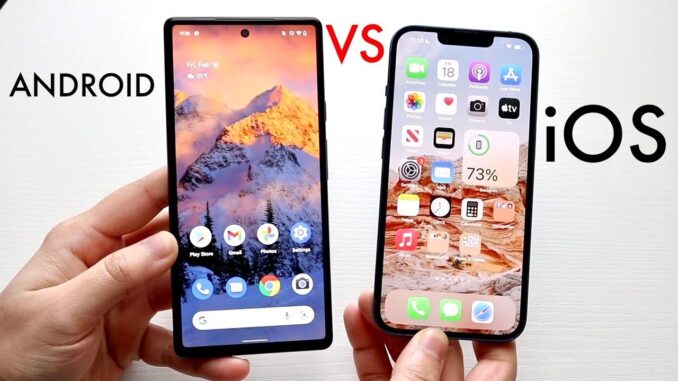
Introduction
Choosing between iOS and Android can be a tough decision, as both operating systems offer unique features and experiences. Whether you’re a long-time user of one platform or considering a switch, understanding the key differences can help you make an informed choice. Here’s a comprehensive comparison to help you decide which OS suits you best.
User Interface and Experience
- iOS: Known for its clean, intuitive interface, iOS offers a consistent user experience across all Apple devices. The design is sleek, and the system is optimized for performance and ease of use. Apple’s ecosystem ensures seamless integration between devices like iPhones, iPads, Macs, and Apple Watches1.
- Android: Android provides a highly customizable user experience. With a variety of manufacturers like Samsung, Google, and OnePlus, users can choose from a wide range of devices with different features and price points. Android allows for extensive personalization, from home screen layouts to widgets and themes1.
App Ecosystem
- iOS: The Apple App Store is known for its strict quality control, which often results in high-quality apps. Developers tend to release apps on iOS first, and the platform is known for its robust security measures2.
- Android: Google Play Store offers a larger selection of apps, including many free options. While the quality can vary, Android’s open nature allows for more innovative and experimental apps. Additionally, users can sideload apps from other sources2.
Hardware Choices
- iOS: Apple controls both the hardware and software, resulting in a seamless integration and optimized performance. However, this means fewer device options, with a focus on premium pricing1.
- Android: Android’s open-source nature means a vast array of devices from various manufacturers. This provides options across different price ranges, from budget to high-end flagship phones1.
Customization and Flexibility
- iOS: While iOS offers some customization options, such as widgets and app organization, it is generally more restrictive compared to Android. The focus is on simplicity and uniformity2.
- Android: Android excels in customization, allowing users to change almost every aspect of the interface. From custom launchers to icon packs and widgets, Android users can tailor their experience to their preferences2.
Updates and Support
- iOS: Apple provides regular updates to all supported devices simultaneously, ensuring users have access to the latest features and security patches. iOS devices typically receive updates for several years1.
- Android: Update schedules can vary significantly between manufacturers. Google’s Pixel phones receive timely updates, but other brands may delay updates due to additional customization layers. However, Android’s Project Treble aims to improve update speeds1.
Security and Privacy
- iOS: Apple places a strong emphasis on privacy and security, with features like App Tracking Transparency and regular security updates. The closed ecosystem reduces the risk of malware2.
- Android: Android has made significant strides in security, with features like Google Play Protect and regular security patches. However, the open nature of the platform can make it more susceptible to malware, especially from third-party app stores2.
Integration with Other Devices
- iOS: Apple’s ecosystem is highly integrated, offering features like Handoff, Continuity, and AirDrop, which allow seamless transitions between devices. This integration is ideal for users who own multiple Apple products1.
- Android: While Android devices can integrate with other Google services and products, the experience can vary depending on the manufacturer. Some brands, like Samsung, offer their own ecosystem of devices and services1.
Conclusion
Both iOS and Android have their strengths and cater to different user preferences. If you value a seamless, integrated experience with regular updates and strong privacy features, iOS might be the better choice. On the other hand, if you prefer customization, a wide range of device options, and flexibility, Android could be the right fit for you. Ultimately, the best OS for you depends on your specific needs and priorities.

Leave a Reply